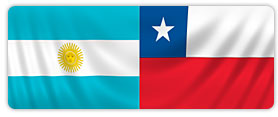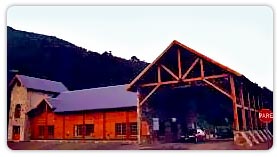 
1.- NATIONAL IDENTITY CARD
Argentinian or naturalized: DNI or Cédula de identidad
Other nationalities: Passport with Chilean visa
(Pursuant to the international agreements in force).
2.- VEHICLE DOCUMENTATION
Vehicle card under the title holder's name.
If you are not the vehicle's owner, you will need authorization by the owner signed before notary public.
Pursuant to legislation passed in 1980, window etching is compulsory for Argentinian vehicles and the fee for such procedure is u$s10.
3.- Valid DRIVER'S LICENSE, an international license is not necessary.
4.-Requirements for Minors:
If you travel with your kids, carry your marriage certificate or your kids’ birth certificates.
Minors leaving the country alone or accompanied by one of their parents must hold an authorization containing the following information items:
-
Minors under 14 years old: destination and personal information about the person who will pick them up.
- Minors between 14 and 18 years old: destination.
If the minor under 18 years old travels accompanied by an adult other than a parent, the authorization must contain the personal information about this person and about destination.
Important: All authorizations previous to this new legislation having been issued and granted until the minor becomes of age will be rendered void.
Minors not holding complete authorization may not leave the country and will be detained at the migrations office.
The travel permit or authorization signed by the absent parent will be notarized and legalized before the Notary Public Association or else before the civil court corresponding to their local judicial district.
When entering Chile, you will pass the following control posts:
International Police: personal documentation
Carabineers: vehicle documentation
Servicio de Agricultura y Ganadería - SAG ( Agriculture and Cattle-raising Service).
In Chile, due to sanitary policies, the vehicle shall be disinfected by frontier personnel.
The entrance of vegetal or animal products and/or by-products inside the passenger's baggage into Chile is forbidden.
Customs:
Tourists must declare all merchandise acquired or received as a gift in one country or another.
Items of personal use, clothes, bath products, personal jewelry, books, strollers, etc (see details below) are permitted into the country free of duty.
Permitted:
All merchandise considered baggage not presumably for commercial purposes.
Non-permitted:
Vegetal food, meats, sausages, etc.
Duty-free exemption: of up to u$s 150 per person over 16 years old, kids under 16, up to $ 75.
Non-exempted:
Purchase invoices shall be presented and the amount surpassing the exemption value of the total purchased merchandise shall be subject to duty.
Currency:
The Peso Chileno is the Chilean currency in force.
If you travel from Argentina into Chile, it is convenient that you should carry some dollars, as they are exchanged more easily and in the event of carrying Argentinian currency, you will be offered between a 5 and 10 percent less.
FOR TRAVELERS FROM OUTSIDE CHILE
TRAVELER'S BAGGAGE: The legislation in force will only free of customs taxes and VAT all travelers' baggage which consist of:
a) travel items, such as: clothes, personal care electrical items, suitcases, briefcases, bags, essential personal use items and all kinds of cosmetic products, etc. All the abovementioned items must be used or worn, should be appropriate for the normal use and necessities of the carrier and may not be intended for sale.
b) Objects of exclusive use for various trades, professions or crafts, used, portable, for manual use and of simple manufacture. Those objects which do not need installation for their normal use and according to the traveler's profession or trade.
c) Tobacco and liquor, per each person over 18 years old, up to an amount that does not surpass:
400 cigarette units (two cartons)
500 gr. of tobacco.
50 cigar units.
Two and a half liters of alcoholic beverages.
The following are expressly excluded from the concept of baggage:
House furniture
Household items, dishes, linen and pictures
Musical instruments
Devices, spare parts and electrical or electronic appliances.
In general, all new merchandise or susceptible to be sold.
The baggage and merchandise to be imported that comply with the requirements may either enter the country together with the traveler or within a 120-day period prior or following the arrival of the beneficiary.
Chileans returning to the country may import other merchandise of up to a FOB value of u$s 1,500, without commercial purposes and free of all duties and other taxes in force.
There is no extra charge for its use, no intervention from the customs broker and no need for an import report.
NOTE: Travelers who buy items in those countries where there are Economical Integration agreements must have the corresponding Certificate of Origin issued by the relevant official authority from their country of origin in order to request a discount or exemption from duties under the agreement, taking into consideration that goods object of this benefit will always be subject to the payment of VAT.
Personal items:
Foreign travelers entering the country as tourists are entitled to importing all those goods part of the Travelers’ Baggage free of Customs duties and taxes (VAT), in the same way as national travelers. (See Travelers’ Baggage)
They may also introduce used items for tourism activities, such as camping, fishing, climbing, sports, filming or photography equipments, microcomputer or items for professional use. Such items may be introduced temporarily for ninety days (period which may be extended) and they should be exhibited when leaving the country, or else, the corresponding import taxes will be canceled.
Temporary admission of the items mentioned hereinabove will be effected by means of a special document called D.A.T.E.T. - Documento de Admisión Temporal Efectos de Turistas (Temporary Tourist Item Admission Document).
Vehicle:
Tourists may introduce their vehicle into the country temporarily for a general term of 90 days (180 days due to the Chile - Argentina agreement). An international driver’s license and vehicle documentation will be necessary. In the event that the driver was not the owner of the vehicle, he should present notarized authorization approved by the Chilean Council abroad, keep the vehicle in their possession and not transfer it, take the vehicle out of the country within the stipulated term or deliver it to the nearest Customs office in case they did not take the vehicle back to the other country within the abovementioned term.
Furthermore, tourists may import or ask for Temporary Admission for other goods entering the country for non-commercial purposes.
Personal items:
Foreign travelers entering the country as tourists are entitled to all those goods that make up the Travelers Baggage import free of Customs duties and taxes (VAT), with the same conditions as national travelers.
Household Items:
For a FOB value of up to u$s 5,000 free of duty and taxes, provided that they are used goods acquired prior to their entrance in the country and in amounts according to the normal use and need of the traveler. The abovementioned goods will be released even when the entrance be effected within a 120-day term from the arrival of the beneficiary and provided that they have been dispatched to their name in the transportation documents.
Labor items:
Up to a FOB value of u$s 1,500, subject to the payment of Customs Duties of a 6% over its customs value and free of Value Added Tax (VAT).
Requirement:
To choose this franchise, the foreign citizen must enter the country with a temporary residence visa or a visa subject to agreement for a period of 1 year or more.
Restrictions:
Foreigners may not import used automobiles. They may introduce vehicles under the Temporary Admission regime, pursuant to the general regulations, by means of the services of a customs officer, with prior authorization by the Customs Administrator and for a 120-day term, with a possibility to be extended, subject to a variable tax to be timely determined.
|



